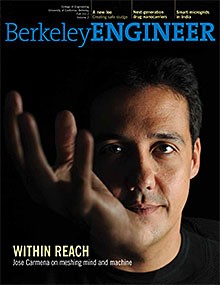Image makers
 Magnetic resonance imaging (MRI) can provide diagnostic images of organs and soft tissues that are much more detailed than computed tomography (CT) scans, and without exposing the patient to radiation. But a major limitation to MRIs has been the slow imaging speed, relative to CT scans, and patients must remain motionless during the screening.
Magnetic resonance imaging (MRI) can provide diagnostic images of organs and soft tissues that are much more detailed than computed tomography (CT) scans, and without exposing the patient to radiation. But a major limitation to MRIs has been the slow imaging speed, relative to CT scans, and patients must remain motionless during the screening.
Staying still can be particularly tricky for pediatric patients, increasing the need for general anesthesia, which carries its own risk of complications. To reduce or even eliminate the use of anesthesia for pediatric patients, professors Michael Lustig and Kurt Keutzer of electrical engineering and computer sciences—in collaboration with Shreyas Vasanawala and Marcus Alley at Lucile Packard Children’s Hospital at Stanford, GE Healthcare and Mark Murphy (Ph.D.’11 EECS)—have developed a solution that drastically reduces the time needed to conduct MRI exams.
Based on a theory known as compressed sensing, this technique performs rapid imaging by collecting fewer MRI measurements than traditionally required, then converts the reduced data into high-resolution images. The process produces images that are sharper and easier to read, and results in a safer and more comfortable experience for the youngest (and wiggliest) of patients.

